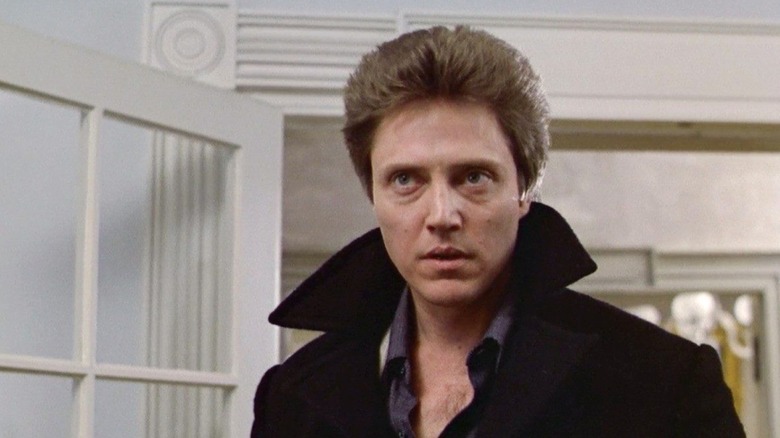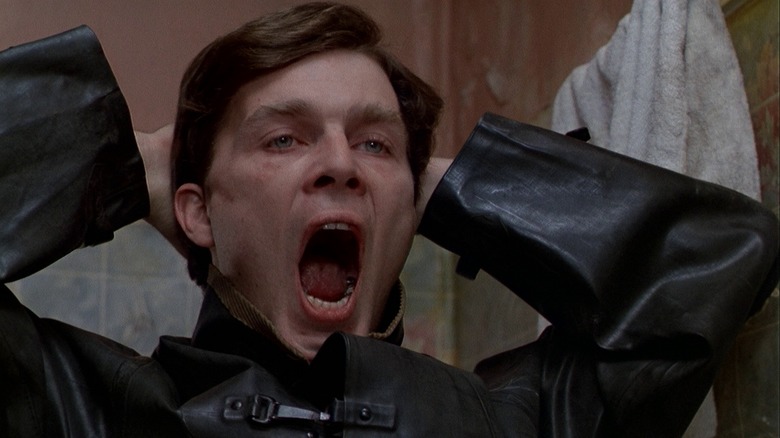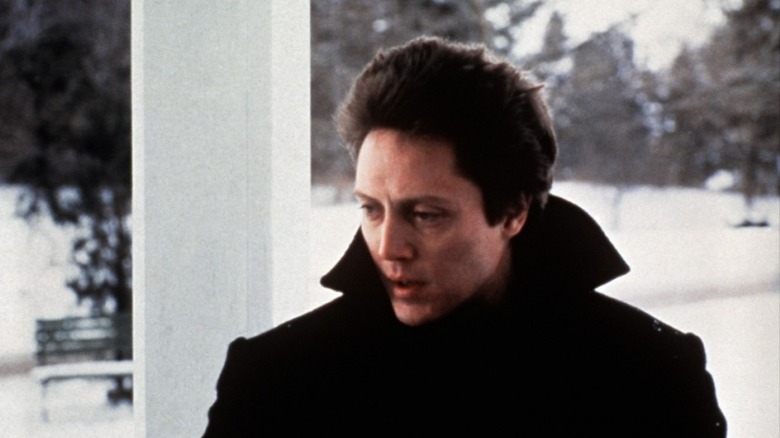A Banned Stephen King Book Was Adapted Into A Christopher Walken Classic In The '80s
We may receive a commission on purchases made from links.
If we take a quick look at the books banned/challenged in schools in Florida, the name of a beloved, bestselling author stands out. Per the Florida-Times Union, 68 (!) Stephen King books were removed from Florida school libraries in 2024 alone, including the ones written under the now-discarded pseudonym Richard Bachman. Some books have been hit with a limited ban since then, meaning that they can be requested on a case-by-case approval basis (with many of these requests still pending).
The reasoning behind such baffling censorship remains unclear, as everything from "Pet Sematary" to "The Shining" can be found on this banned/restricted list. Moreover, not every story on this list veers into horror territory or deals with sensitive subject matters ill-suited for students in certain grades. This isn't a recent issue by any means, as these Florida bans on King's oeuvre can be traced back to as far as 1992.
On March 20, 1992, King released a statement in response to the banning of two books in Florida schools — "The Dead Zone" and "The Tommyknockers" — and commented on this long-standing censorship trend and its impact on the younger generation:
"They [the book banners] had pulled two of my books, The Dead Zone' and 'The Tommyknockers,' from the middle-school library shelves and were considering making them limited-access items in the high school library. What that means is that you can take the book out if you bring a note from your mom or your dad saying it's OK [...] If you [the parents] are not careful and diligent about defending the right of your children to read, there won't be much left, especially at the junior-high level where kids really begin to develop a lively life of the mind."
King's statement is lengthy and thorough, where he urges the kids not to argue, protest, or organize rallies, but focus their energy on public libraries and local bookstores instead, where they can seek out the books that are banned. Before we dive into his statement, let's take a look at "The Dead Zone," which got a classic 1983 adaptation treatment that received really positive reviews. The aim while dissecting the book and its corresponding film is this: why was this possibly banned, and what was the fuss all about?
The Dead Zone has only become scathingly prescient over the years
King's "The Dead Zone" is an entertaining page-turner, rooted in a trope-heavy tale of a boy named Johnny Smith, who gains clairvoyance after a damaged portion of his brain becomes a dead zone. Although the novel will keep you hooked, it is very much a slow-burn, where Johnny has to gradually get accustomed to the fact that coming in contact with people unexpectedly triggers his abilities. Doing his best to commit to the right cause, Johnny aids the authorities in solving crimes, but his world comes to a standstill once he shakes hands with one Greg Stillson, whose brand of evil is so overwhelming that he must be stopped at all costs.
David Cronenberg's "The Dead Zone" tackles this story with added nuance, as it embraces the director's polished approach to physical metamorphosis that extends to spiritual truth. Christopher Walken's Johnny is as conflicted and complex as you would expect him to be, burdened by a strange gift that he desperately wishes to use for a worthwhile purpose. Throughout this taut, rich tale, Cronenberg frames Stillson (Martin Sheen) as a corrupt, insincere politician, fleshing out this Big Bad as someone who uses his tactless charm to appeal to mob mentality and rouse inflamed emotions. The mundane prevalence of Stillson's villainy is so ingrained in everyday reality that Johnny's oddest impulses feel more natural in comparison, with Cronenberg setting them up as opposing forces of nature who must clash at some point.
When Johnny shakes Stillson's hand at a political rally, he is stunned by horrific visions of a pre-emptive nuclear strike, with Stillson as President leading the country to war. What Johnny experiences next isn't a moral quandary at all, as he's firm in his belief that eliminating such unchecked evil is necessary in the face of saving the lives of millions. "The Dead Zone," after all, is about personal choice in the face of destined outcomes, where Johnny chooses to sacrifice himself to prevent men like Stillson from plunging innocent lives into chaos and strife.
Keeping these overarching themes in mind, one can argue that Cronenberg's adaptation is more politically charged — and prescient — than its book counterpart, making its middle-school ban more absurd than ever before.
Why King's 1992 statement on book-banning is significant even today
While "The Dead Zone" can still be found among the list of restricted or challenged Stephen King books, it used to be a staple during the censorship craze that spanned 1990-1999 in the United States. The cited reason, however, had nothing to do with the strong political subtext of the fictional events, but the use of foul language in some portions of the story. This is egregious enough, but the disdain towards King's writing seems to stem from a general knee-jerk response to horror as a genre, which explores uncomfortable facets of the human experience. Regrettably, such myopic attitudes towards horror are still prevalent in some pockets of the world at large.
Circling back to King's 1992 statement, he makes a good point of urging kids to question why these books might have been banned. Is the perceived hullabaloo over nothing, or are these bans an effort to sweep essential truths or constructive criticism (of institutions of power) under the rug? King mentions authors like J.D. Salinger and Mark Twain, whose books have been banned in public schools for decades, despite promising literary value that should be experienced or evaluated to expand one's horizons. His advice extends to parents, whom he warns about the pitfalls of such efforts to restrict/cheapen the learning experience, which he likens to "a kind of intellectual autocracy." Finally, he addresses every concerned/interested citizen and appeals to their reason:
"Please remember that book-banning is censorship, and that censorship in a free society is always a serious matter [...] When a book is banned, a whole set of thoughts is locked behind the assertion that there is only one valid set of values, one valid set of beliefs, one valid perception of the world. It's a scary idea, especially in a society which has been built on the ideas of free choice and free thought."
This sentiment also extends to filmmaking (or any art, for that matter), so one can only hope that a resurgence in censorship of any kind tapers off with time. In the meantime, be sure to watch Cronenberg's topical, brilliant "The Dead Zone," which is currently available to stream for free. If you want more of this strange world funneled through the lens of a procedural, check out USA Network's canceled "The Dead Zone" series that spans six seasons.


